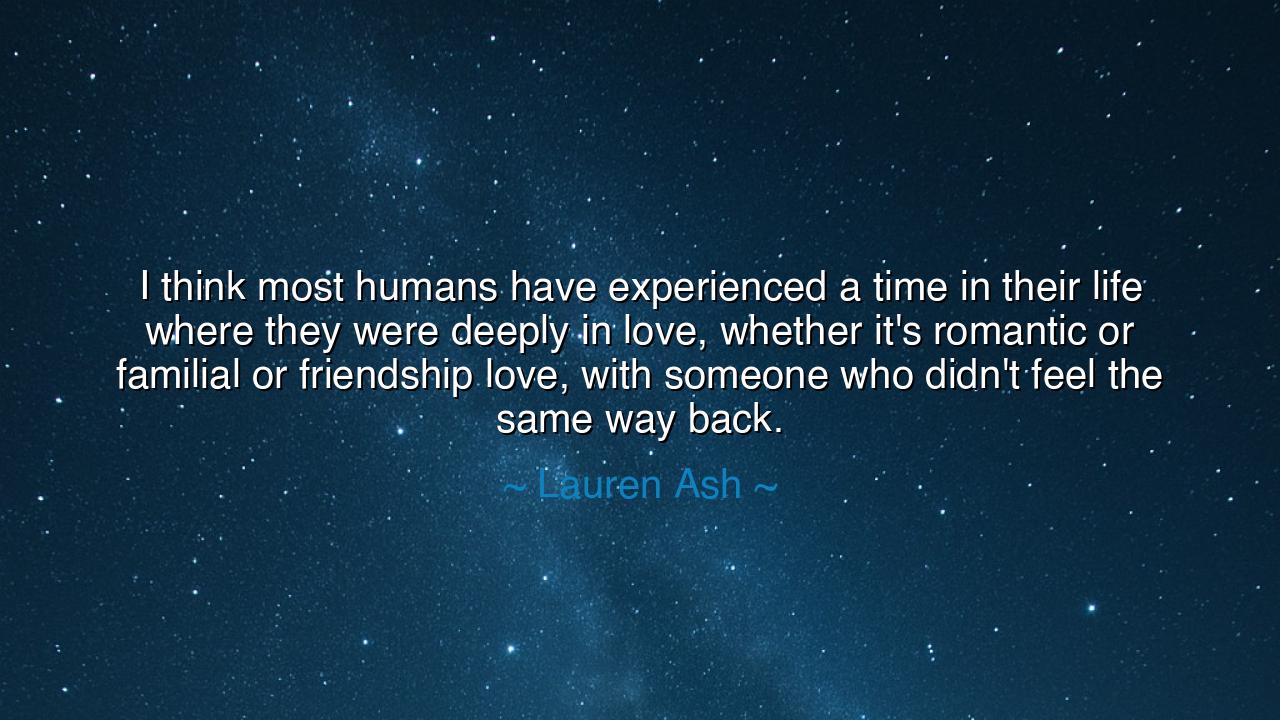
I think most humans have experienced a time in their life where
I think most humans have experienced a time in their life where they were deeply in love, whether it's romantic or familial or friendship love, with someone who didn't feel the same way back.






In the labyrinth of human emotions, few experiences are as universally painful as unrequited love. In the words of Lauren Ash, "I think most humans have experienced a time in their life where they were deeply in love, whether it's romantic or familial or friendship love, with someone who didn't feel the same way back," we encounter a deep truth that has resonated through the ages. To love someone, to open your heart and soul to them, only to have that love unreturned, is a sorrow that knows no bounds. Whether it is the romantic yearning for a lover, the longing for a family member’s affection, or the desire for a friend’s emotional connection, the pain of unreciprocated love is a wound that has been felt across time, in the hearts of all who have loved deeply.
In the ancient world, the philosophers spoke often of love in all its forms, its ability to uplift and to wound. Plato, in his Symposium, explored the complexities of Eros, the god of love and desire, acknowledging that love could lead to both exaltation and despair. The Greeks understood that love, especially unrequited love, could become a source of profound anguish—a longing that could drive a person to madness or, at the very least, to self-reflection. In Symposium, love is not just a source of joy, but a force that can cause discomfort and pain, particularly when the object of affection does not return the feelings. Socrates, in his dialogue with his friends, would have understood the experience of unrequited love not as something to be ashamed of, but as a necessary aspect of human experience, one that teaches us humility, growth, and resilience.
Cicero, the great Roman philosopher, similarly spoke of love as a force that could shape a person’s character. In his work De Amicitia ("On Friendship"), he highlighted the depth of emotional bonds that friendship could create, but also acknowledged that sometimes these bonds are not returned in equal measure. He would have understood that, in the natural course of life, not all affections would be reciprocated. This unreciprocated love is a trial—a painful test of our strength and self-worth. Yet, for Cicero, even this sorrow was a stepping stone toward maturity, a path that forces us to examine our inner selves and to refine our character through the painful but instructive process of letting go.
Consider the tragic story of Pyramus and Thisbe, the lovers from ancient Babylon whose love was thwarted by circumstances, and whose unrequited longing led to a tragic end. Separated by a wall and unable to be together, they communicated through a crack in the wall, only to have their plans for a secret meeting foiled by fate. When Thisbe arrives at the meeting place, she believes Pyramus to be dead and takes her own life. When Pyramus discovers her lifeless body, he, in turn, takes his own life. The story of Pyramus and Thisbe illustrates the destructive power of unreciprocated love, as well as the depth of the emotional pain that can arise when love is not returned. Yet, their story also speaks to the human condition, reminding us that our experiences of love, whether fulfilled or unrequited, shape us in ways that define our understanding of the world and ourselves.
Lauren Ash's reflection resonates deeply with this age-old truth: unrequited love is a universal experience that transcends cultures and epochs. Whether it is a romantic love that goes unreturned, the desire for familial affection that remains unfulfilled, or the longing for friendship that is not returned in kind, the pain is the same. But in this pain, there is also growth—for it forces us to look beyond the object of our desire and toward ourselves. It challenges us to ask: what is it that we truly seek in others, and what is it that we must cultivate within ourselves in order to find peace?
The lesson from Ash’s words is clear: while unrequited love may feel like an overwhelming burden, it is also an opportunity to reflect on our needs, our expectations, and our strength. True love—whether romantic, familial, or platonic—is not a one-sided affair. It is a shared experience, an exchange that nourishes both the giver and the receiver. When love is not returned, it does not diminish our value, but rather teaches us the profound importance of self-love, acceptance, and the capacity to move forward. It is a reminder that our worth is not determined by the affection of others but by our own ability to love ourselves and to embrace the lessons that come from loss.
So, when you find yourself in the sorrow of unrequited love, remember that you are not alone. Every great soul in history has faced this trial—whether in the form of romantic longing, family estrangement, or unreciprocated friendship. Embrace the pain as a teacher, for it is through such struggles that we gain clarity, strength, and understanding. Learn to direct your love inward, nurturing your own soul with the same kindness and care that you have extended to others. In doing so, you will not only find peace but will also prepare yourself for the day when true love—in its many forms—will come to you, not because you need it to complete you, but because you are already whole.






AAdministratorAdministrator
Welcome, honored guests. Please leave a comment, we will respond soon